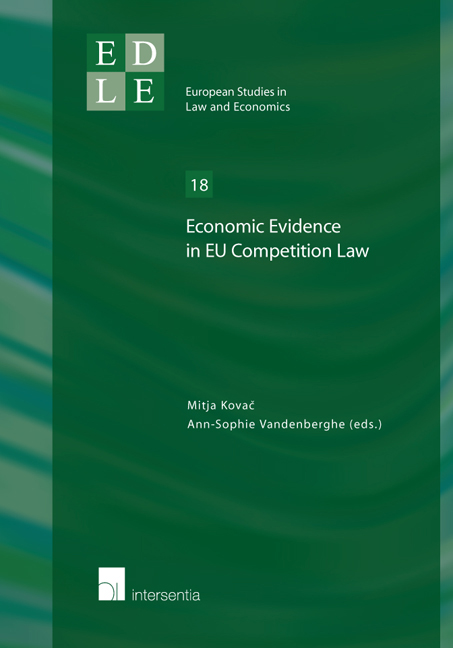Book contents
- Frontmatter
- Dedication
- Preface
- Contents
- List of Contributors
- General Introduction
- PART I ECONOMIC METHODS IN COMPETITION LAW
- PART II ECONOMIC EVIDENCES IN COMPETITION LAW
- PART III INSIDER TRADING, CARTELS AND CRIMINALISATION
- Chapter 8 An Analysis of the Criminalisation of Insider Trading at EU Level
- Chapter 9 The Criminalisation of EU Competition Law
- Chapter 10 Cartel Detection and Collusion Screening: an Empirical Analysis of the London Metal Exchange
- Chapter 11 Damages Claims in the Spanish Sugar Cartel
- PART IV PRELIMINARY RULINGS AND STATE AID CONTROL
- PART V ECONOMIC EVIDENCE, ENFORCEMENT PROBLEMS AND NATIONAL COURTS
- Index
Chapter 8 - An Analysis of the Criminalisation of Insider Trading at EU Level
from PART III - INSIDER TRADING, CARTELS AND CRIMINALISATION
Published online by Cambridge University Press: 21 September 2018
- Frontmatter
- Dedication
- Preface
- Contents
- List of Contributors
- General Introduction
- PART I ECONOMIC METHODS IN COMPETITION LAW
- PART II ECONOMIC EVIDENCES IN COMPETITION LAW
- PART III INSIDER TRADING, CARTELS AND CRIMINALISATION
- Chapter 8 An Analysis of the Criminalisation of Insider Trading at EU Level
- Chapter 9 The Criminalisation of EU Competition Law
- Chapter 10 Cartel Detection and Collusion Screening: an Empirical Analysis of the London Metal Exchange
- Chapter 11 Damages Claims in the Spanish Sugar Cartel
- PART IV PRELIMINARY RULINGS AND STATE AID CONTROL
- PART V ECONOMIC EVIDENCE, ENFORCEMENT PROBLEMS AND NATIONAL COURTS
- Index
Summary
INTRODUCTION
Traditionally it was considered that the EU has no competence in the area of criminal law. However, the European Commission increasingly noticed that in some cases Member States formally implemented European Directives, but did not seriously enforce the national legislation implementing the EU Directives. For that reason the European Commission increasingly sought to force Member States to sanction violations of national legislation implementing EU law with criminal sanctions. This desire of the Commission was backed up by the European Court of Justice in the decision of 13 September 2005 where it decided that when the application of effective, proportionate and dissuasive criminal penalties by the competent national authorities is an essential measure for combating serious environmental offences, criminal law may be prescribed on the condition that it is necessary in order to ensure that the rules which it lays down on environmental protection are fully effective.
Meanwhile, the European Commission has used these powers in the environmental area with the so-called Environmental Crimes Directive of 19 November 20082 and through Directive 2009/123 on Ship Source Pollution of 21 October 2009. These powers of the EU to force Member States to use criminal law have now also been laid down in the Lisbon Treaty.
Although initially limited to the domain of environmental criminal law, the Commission apparently intends to broaden EU criminal law also to the area of economic law and more particularly to insider trading. The Directive on criminal sanctions for market abuse 2014/57/EU entered into force the 3 July 2014. The idea is to introduce minimum rules on criminal offences which have to be transposed into national criminal law and applied by the criminal justice systems of the Member States. The reason for the Commission to come with this initiative is that today Member States’ enforcement practices significantly diverge. The Commission argues that this may provide incentives for persons to carry out market abuse in Member States which do not provide for criminal sanctions for these offences or provide weak enforcement.
- Type
- Chapter
- Information
- Economic Evidence in EU Competition Law , pp. 149 - 176Publisher: IntersentiaPrint publication year: 2016



